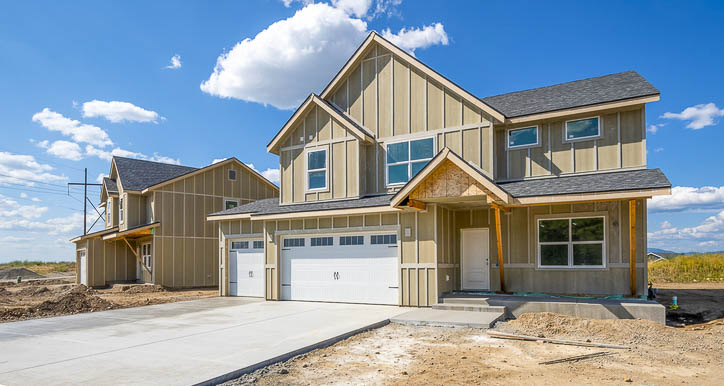
Mark Harmsworth believes the solution to housing affordability is to increase supply through a reduction in unnecessary regulations and not passing restrictive ‘feel good’ policies that will have negative long-term consequences
Mark Harmsworth
Washington Policy Center
During the pandemic, Governor Inslee (D) used Washington State emergency powers to enforce a moratorium on evictions which gave temporary relief to renters from paying rent, but placed property owners, trying to cover the cost of the rental property, under severe financial stress.

The moratorium was extended multiple times, challenged in court and ultimately was narrowly upheld by the Washington State Supreme Court. A challenge to this case is currently in front of the US Supreme Court (the Washington Policy Center has signed on to an Amicus Brief) as many property owners lost significant money because of the government’s taking of private property.
The state legislature, in bi-partisan effort with Senate Bill 5909 this legislative session, attempted to curb Governor Inslee’s emergency powers. The bill failed to garner enough votes in the House after passing the Senate earlier in the 2022 session.
Many renters, during the moratorium, continued to pay rent on time or worked with property owners on payment plans as they understood that ultimately, if the property owner couldn’t afford to pay the mortgage, the renter would be out on the street anyway.
The cost of building housing directly affects the cost of rent. As construction prices increase, so do mortgages and the additional cost is passed onto the renter. Washington State’s exuberance to continue to pass costly new law and rules without considering the longer-term consequences to construction cost and housing supply, is one of the main reasons for high rents.
Local municipalities have been in on the act too, with cities such as Tukwila considering rent caps and Bellingham passing rent control, which will only increase rent still further.
Here are some of the mis-guided efforts to control housing costs that resulted, or in the case of failed legislation, would have resulted in higher rents.
- Eviction moratoriums decreased rental property availability and punished homeowners for renting property during the pandemic.
- Washington State Building code restrictions including banning new clean burning natural gas in home installations, driving up the cost of housing construction and remodels.
- A new 1% tax on selling multi-family units (House Bill 2276) driving up the cost to sell a home, which failed to pass.
- Rent control efforts in the Washington State Legislature (House Bill 2114) that ultimately failed to pass, but will drive up rents.
- Limiting pet deposits (Senate Bill 6064) which effectively bans pets from rental property – failed to pass.
- Unrestricted government spending, resulting in inflation which has driven increases in mortgage rates putting a mortgage beyond the reach of many homeowners.
- Unrestricted illegal immigration into the US which has reduced available housing for US residents.
- Outdated and restrictive zoning regulations (the Washington State Growth Management Act) which restrict the amount and location of housing that can be economically built.
- Legislative attempts to overturn Initiative 747 (Senate Bill 5770) that limits the amount a municipality can raise property tax rates each year.
- Excessive transit taxes which drive up the cost of a mortgage.
While housing advocates are pushing policies that would increase the cost of owning or renting a home, there are ways housing and rent costs can be reduced if legislators and municipal leaders act.
Reverse course on banning natural gas in homes. Natural gas is clean burning, abundant, and an efficient way to heat homes. Moving to fully electric heating will drive up costs, not only in the monthly energy costs, but in the retrofitting, estimated at $39,767, of existing homes to meet the new energy standards. In colder climates, particularly in Eastern Washington, electric heat is very expensive once the temperatures drop below freezing.
Rent Control is a bad idea. Do not pursue rent control which will only drive-up rents. Rent control artificially sets a price for current renters and restricts housing supply which ultimately will drive up rents. The short-term relief in rental rates is quickly overwhelmed by price increases once a tenant leaves the rental property.
Reform the Growth Management Act (GMA). The GMA needs to be updated to allow expansion of municipal borders for new construction. Currently the GMA restricts where homes can be built and forces municipalities to meet population targets though annexation (the consumption of existing surrounding neighborhoods into the city limits) or upzoning to higher densities.
Move to a higher cost recovery on transit. Currently homeowners are required to pay increased property taxes for transit. Both local and regional transit authorities need to shift the cost to run transit to the users of the system more equitably.
Review and eliminate unnecessary building codes. Similar to California’s efforts, Washington needs to eliminate unnecessary building restrictions and impact fees that are driving up the cost of building a new home. The building industry estimates building codes are adding $141,784 to the cost of building a $453,948 home, or put another way, increasing the cost of building a new home by $31%.
Ultimately, lower housing and rental costs are driven not by government regulation, but by housing availability. The solution to housing affordability is to increase supply through a reduction in unnecessary regulations and not passing restrictive ‘feel good’ policies that will have negative long-term consequences.
Mark Harmsworth is the director of the Small Business Center at the Washington Policy Center.
Also read:
- Opinion: We need a right-to-work constitutional amendment – here’s whyMadi Clark of the Mountain States Policy Center discusses the need for a right-to-work amendment.
- Opinion: Eyes on the Board ActJulie Barrett believes The Eyes on the Board Act is not just good policy, but it may be the very thing that starts turning our education system around and getting our students back on track.
- POLL: Do you believe the city of Vancouver should be required to get public approval to take away traffic lanes as part of its Complete Streets ordinance?Do you believe the city of Vancouver should be required to get public approval to take away traffic lanes as part of its Complete Streets ordinance?
- Letter: May is Mental Health Awareness MonthVancouver resident Wynn Grcich asks how Dr. Alan Melnick’s study on racism in health care going to benefit anyone?
- Opinion: Anonymous letter shows how nasty the education debate can becomeLiv Finne of the Washington Policy Center offers anecdotal evidence of how mean-spirited the public debate over education can become.











IF the DIMS continue forward? WE are ALL going to be living on the streets! Last Fall we were told our Natural Gas was in abundance so rates went down. NOW? Insleez has added some stupid ‘Climate Change’ portion to our Bills and all our rates are Higher again! WE MUST get these people out of office or we are in BIG Trouble! I used to be a DIM back when the reason for being one meant something! Now we are just dealing with a purely ANTI-person evilness. WE better protect ourselves from it!
Oh it’s coming from both sides, make no mistake about that. Who moved the embassy to Jeruselem? Who rolled out Covid and operation Warp Speed? Who said “take the guns and do the due process later”? Who was crowned ‘king’ and given the silver Torah crown and menorah by a bunch of Babylonian trickster money changers? They want us dead and/or permanently enslaved and they will NOT use a so-called democrat for that. It’s been decided. We are being funneled in that direction and the fact that people are either completely blind to this or willfully support it (see MAGA or the folks who go to Reaeaken America gatherings) is mind-blowing.
Executive order for genetically modified bioweapons in 2019 – Trump. Emergency order for a phony pandemic 6 months later – Trump. Pro-corporate, anti-american, anti-christian, anti-liberty sellout – Trump. Gun control measures by fiat -Trump. So much more believe me. Check out the upside-down triangle making a cryptic triple six on Trump toewer in NYC:
https://www.trump.com/residential-real-estate-portfolio/trump-tower-new-york